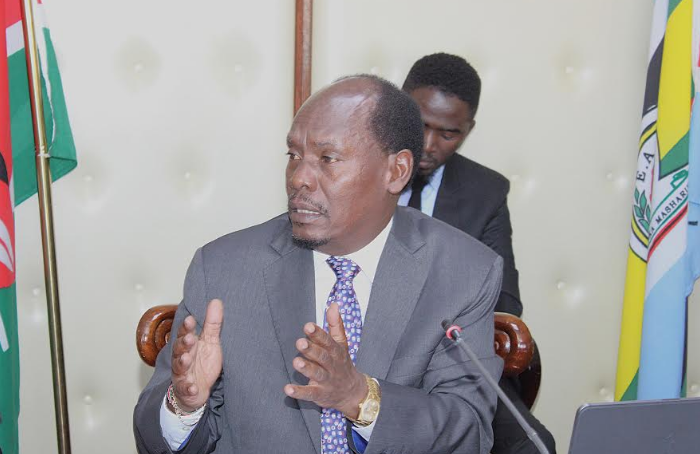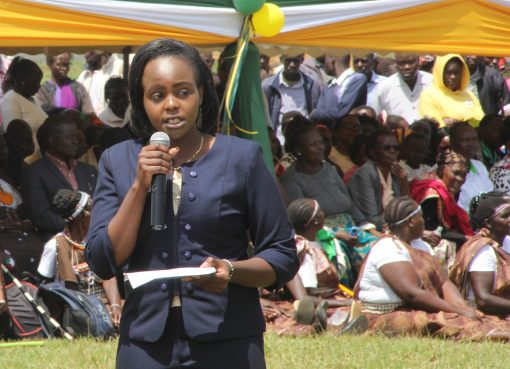The Cabinet Secretary (CS) for Information, Communications and the Digital Economy, William Kabogo, has called for urgent and coordinated action to tackle the growing e-waste crisis in Africa.
While speaking at the 7th East African Communication Organisation (EACO) Regional Conference on Sustainable E-Waste Management in Nairobi Monday, the CS emphasised the need for strong policies, regional cooperation, and private-sector involvement in addressing the challenge.
In a speech delivered on his behalf by the Principal Secretary (PS) State Department for Information Communication Technology (ICT) and the Digital Economy Eng. John Tanui, Kabogo painted a grim picture of e-waste in Africa, citing global statistics that showed the continent lags behind in formal e-waste management.
“According to the Global E-Waste Monitor 2024, only one per cent of e-waste in Africa is formally collected and recycled, which is unacceptable, and we must change it,” he stated, adding that e-waste is a growing threat to Africa.
Kabogo noted that while Africa generates less e-waste per capita compared to other regions, over 60 per cent of it comes from imports, with mobile phone penetration skyrocketing and the sale of electronic goods increasing, warning that e-waste would continue to rise unless urgent measures were taken.
The CS, however, commended Kenya’s efforts in developing a robust regulatory framework for e-waste management, which has positioned the nation as a leading hub in policy and actions.
Additionally, he highlighted the Extended Producer Responsibility (EPR) regulation, which ensures that manufacturers take responsibility for the disposal of their products.
“Kenya is among the few African countries that have enacted laws compelling producers to manage e-waste responsibly, a step in the right direction,” reiterated Kabogo.
He also praised public-private partnerships, such as those with WE Centre, which refurbishes and donates ICT devices for reuse while also recycling e-waste.
“Collaboration between governments, civil society, and businesses is key to solving the e-waste problem,” noted the CS.
While acknowledging Kenya’s progress, Kabogo stressed that e-waste management required harmonised efforts across East Africa while challenging regional leaders to develop policies, set targets, and monitor progress in collection and recycling.
Citing projections that global e-waste would reach 82 billion kilogrammes by 2030, he called on stakeholders to rethink their strategies, stressing that without action, Africa would bear the brunt of poor disposal practices, leading to environmental and health hazards.
Further, the CS urged all stakeholders to take responsibility by investing in e-waste management, setting ambitious targets, and ensuring compliance across the board.
He observed that the 7th EACO Regional Conference on Sustainable E-Waste Management is setting the stage for critical discussions on tackling one of Africa’s most pressing environmental challenges.
In his own remarks, PS Tanui urged East African nations to shift from being consumers of electronic devices to producers as a strategy for managing e-waste, calling for the urgent need for local manufacturing and stronger e-waste management policies.
With 67 million phones in use in Kenya and millions of devices reaching their end of life each year, he emphasised that Africa must invest in local electronics production and semiconductor technology to control the entire life cycle of electronic products.
In addition, he also challenged the region to develop homegrown digital platforms and software instead of relying on global tech giants.
“What percentage of the digital platforms and software we use are developed locally?” he challenged, urging regulators to create policies that support local innovation.
Moreover, the PS called on EACO to establish subcommittees focused on electronic production, software development, and digital platform growth to strengthen East Africa’s role in the global digital economy.
Also speaking at the event was the Chairperson of the Board of the Communication Authority of Kenya (CA), Mary Mungai, who emphasised the urgent need for strong policies, public awareness, and infrastructure to manage e-waste effectively.
“Public awareness is critical. We must educate citizens on the environmental impact of e-waste and the importance of proper disposal,” she rallied.
Furthermore, Mungai highlighted the economic potential of e-waste recycling and called for the government, manufacturers, and civil society to work together in developing a comprehensive management system that supports a sustainable circular economy.
Meanwhile, CA Director General/Chief Executive Officer (CEO) David Mugonyi emphasised the urgent need for strong regulations and regional cooperation to tackle e-waste.
“The sustainable management of e-waste is the price of admission to the League of Digitally Developed Nations,” he established.
Mugonyi highlighted Kenya’s progress, including the Sustainable Waste Management Act and extended producer responsibility regulations, while urging collaboration among East African nations to align with the African Union’s E-Waste Management Plan and attract investors in recycling and proper disposal initiatives.
By Clinton Ng’iela




